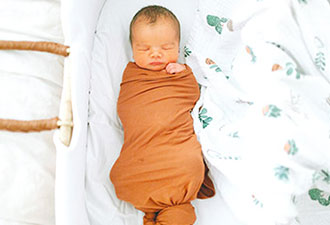Many advocates of swaddling describe it as the secret to calming your infant and promoting better sleep. When you think that babies spend an average of 37 weeks feeling safe and secure in the womb, it’s no wonder that being in the outside world can be an overwhelming experience. That’s where swaddling can help to imitate the warmth of the womb as your little one adjusts to their new environment. Some of the benefits of swaddling include:
- Babies up to three to six months have a strong startle reflex (Moro reflex). This causes them to flail their arms and legs, and the sudden movement can disturb their sleep. Swaddling helps to decrease the movement and stop this from happening.
- It gives a baby the feeling of being held close.
- Newborns often scratch their delicate skin easily and swaddling is a good way to keep their hands from touching their face.
- The blanket keeps very young babies warm and cosy until they’re able to regulate their own temperature more effectively.
Swaddling safety
Blankets are generally not recommended for babies up to 12 months because of the risk of suffocation and Sudden Infant Death Syndrome (SIDs), leading some people to be concerned about swaddling. However, the American Academy of Pediatrics (AAP) recognises the benefits when the practice is done properly, following Safe Sleep Guidelines. The main thing is to make sure that the blanket isn’t too loose, allowing it to unwrap and cover the baby’s face. You also need to be cautious of securing the blanket too tightly around their hips, as this can cause problems with the hips and joints.
- Always place the baby to sleep on their backs and tuck the bottom of the blanket underneath them.
- Check that you can fit two to three fingers in between the blanket and your baby’s chest at the top. The bottom of the blanket should provide room for the baby’s legs to stay bent.
- Avoid overheating by keeping the room at a comfortably cool temperature (around 20-24 degrees Celsius in Dubai) and don’t be tempted to dress your baby in multiple layers; a pair of pyjamas and the swaddle should be enough.
- Let your baby sleep in their own crib rather than your bed.
- Keep the environment smoke-free.
- It’s recommended to stop swaddling once your baby is able to roll over onto their front.
Technique
Start by laying the blanket out flat, folding one of the top corners down. Place the baby on top of the blanket, face up with their head above the folded corner. Straighten their left arm and wrap the left corner of the blanket over their body, tucking it between their right arm and the right side of their body. Tuck the right arm down and fold the right corner over the body tucking it under the left side. Then, fold the bottom of the blanket up loosely and secure it underneath them.
Swaddling is just one of the many baby care topics we cover in our pre and postnatal sessions at Nightingale, contact us to find out more. Our newborn baby care nurses can help you with it.





